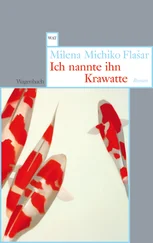We two returned home. A rattle lay in the hallway. Kyōko bent down, picked it up. I said, out loud: Perhaps it’s better like this. Kyōko turned around towards me, rattling. Her eyes widened: For whom was it better? For you? She left me standing there with that question, went into the baby’s room, locked the door behind her. I listened for a sign, heard nothing but the watch ticking on my wrist. After an hour I gave up, sat down in front of the television and turned up the volume.
91
Years later.
Kyōko, catlike, curled up on the couch and spoke into a cushion. Always the same: You know what? That night in August. When you said: Perhaps it’s better like this. I’ve never in my life experienced such enmity towards you as then, when you said that. In your suit. Your tie was crooked. Dark patches at your armpits. I sat on Tsuyoshi’s bed and felt bitter enmity towards you. For six long months I struggled not to feel it, not when you came home drunk, not when you, in your drunken state, complained that your life was a dead end. But then it consumed me. Finally. It was the mournful longing to join him, on the other side. Friendly Death. I wanted him. In the midst of the enmity he appeared to me as a friend who would welcome me fondly, enfold me in his heart. Blessed night. I wanted to count sheep until the last one jumped over the fence. But. What do you think? What stopped me? Listen carefully! The simple thought that I have to get up at six o’clock and prepare your bento. Absurd. Isn’t it? An unparalleled absurdity. The thought that you need me. Me, who one day, today, will say to you: I see through you and your inability. Behind all your inability I see a person who suffers. This was the thought that saved me. All at once I saw you, how you travel to work and back, work and back, and all at once I saw that you’re rolling a rock, I’ll roll it with you. On and on. We’re rolling together up a steep mountain path.
92
Three rice balls. Tempura. Seaweed salad.
If Tsuyoshi were alive he would be thirty-one years old. A good age. He separated the chopsticks. An age when you can look back, and forward too. Would you like some?
I nodded.
Here, take a rice ball. Is it good?
Yes. It’s the best rice ball I’ve ever tasted.
He laughed, wiped the back of his hand across his eyes. Invisible tears. I wish I could sit with him like this and eat Kyōko’s bento together. I mean. Like with you. Don’t you think? He indicated with the chopsticks in one direction then another. In some way they are all here in the park. The man there with the young woman on his arm. That’s Hashimoto. The old woman with the walking stick who is limping behind them: His wife. The one with the book over there, pen in his mouth, is Kumamoto. In the shade of the tree, pulling her skirt over her knee: Yukiko. The man sitting by the fountain feeding the pigeons. He could be the teacher. All of them here. Under this sky. You only have to look.
If that’s so, I wanted to say, then I would like to be your son. But I didn’t say it. Instead I asked him a favor. There is something, I began.
What is it?
There is something you could do for me.
Well, tell me.
Please tell your wife the truth, this very evening, that you have lost your job. You owe her that. After all that has happened, all that has not happened.
I promise you, I will do it. And you, you promise me that you’ll cut your hair short, this very evening. I’ve waited long enough, not saying it, you look dreadful with that shaggy mane.
I laughed with him: Good, it’s agreed.
On Monday we won’t recognize each other.
Will you come?
Yes, of course.
And then?
A new beginning.
93
That afternoon I was the one who fell asleep. I fell asleep and dreamed: I was in my room. Cold sweat on my hands. I lay stretched out on my bed, a corpse. With all my strength I tried to move. Then I heard Father’s voice: Nothing to be done. The boy is dead. I wanted to call out: No, I’m alive! But I had no mouth. Above me was a mirror. I saw I had neither mouth nor eyes. With eyes I didn’t have, I saw that my face was a white wall. Mother’s voice: It’s too bad, about him. He never found his face. At this moment the curtains opened. A harsh light came through the window and fell on the white wall, which was me, and suddenly in the mirror I saw the wall crumble, and then the four walls of my room crumbled away too. Wide open space all around me. Someone touched me. I ran after him. As I ran I got back my mouth and eyes. A stinging on my cheeks. I noticed I was crying. My tears were red threads, flowing down me. I have not forgotten, I cried, how to weep for you, my dear child.
When I awoke he was no longer there. Beside me, over the bench arm, hung his tie. I put it in my pocket and felt the material, warm silk. A new beginning, he said. I dragged myself through the park, over the intersection, past Fujimoto’s, home. My parents were standing looking worried in the doorway. There you are. Thank God. We were going to. But I was too tired to respond with anything more than my weary, thoughtless: Tadaima. I am home. My parents, with one voice: Okaerinasai. Welcome back.
94
This very evening. We had an agreement. I kept to it. With the scissors in my right hand, I cut strand by strand, until my head felt light and cool. Once cut, the hair all over the floor was no longer mine, and I thought, it would be the same for him. Once spoken, the burden of the truth would fall away and afterwards he would not be able to explain why he had put it off for so long. Like me he would stand in front of the mirror and find himself strange and familiar at the same time. He would think of me and say to himself: To cut your hair is to admit the truth.
Yet the familiar prevailed. The question: How should it continue? Our friendship was the larger space into which I had stepped. I decorated its walls with pictures of the people we described to each other, and the thought that I might have to leave it, through a door leading I knew not where, to expose myself to the unknown, that thought hovered dangerously. I almost hoped he would postpone his confession again, turn up on Monday and imply silently that he had failed. It was a mean hope. I pushed it away. I spent the whole weekend pushing it into a corner. On Sunday evening there was only the feeble wish that I had taken the chance to tell him I wished I were his son.
95
Nine o’clock. That must be him. Short-sleeved shirt, Hawaiian pattern. He came towards me, his face strangely youthful. No, a mistake, it wasn’t him. That one there behind him though. Shoulders bent forward. Stealthy walk, as if he wanted to avoid someone. Yes, that was him. Then: No. And again: Yes. Then: No, it’s not. And: Wrong again. How could it be? Surely something must have detained him. A delay. Surely. He would be here any moment now. The figure by the bushes. Was that a man? Or a woman? Or a child? What if he? I waited. Eyes scanning. Surely it was a misunderstanding. So many people, they came and went. I hadn’t noticed them before. What if something happened to him? With every false sighting I discovered a reason for his absence. Once it was a headache, then it was the death of a distant relative, a summer flu, someone urgently needed his help. With the tie grasped between my two fingers I waited, it was no longer clear for whom.
Midday. In the park, bentos were being unpacked. Sitting scattered in little groups, eating, drinking, chatting. I thought of Kyōko and wondered whether, out of habit, she had really gotten up at six o’clock even today. Or whether she had stayed in bed, had asked him not to go. Whether she knew about me. And whether she would come here to tell me the news if something had happened to him. The woman up there, that could be her. I had the impression she was looking for someone. I am here, I almost called out, but then I saw, she was already happily arm in arm. All at once I was ashamed I had ascribed such importance to myself. I turned up my collar. Who was I, to think that Kyōko must be looking for me? Who was I to think she must feel some obligation towards me? I watched her as she disappeared behind one of the trees. As they walked the salaryman beside her very gently laid his hand on her neck.
Читать дальше












